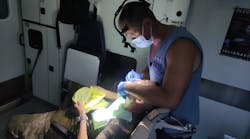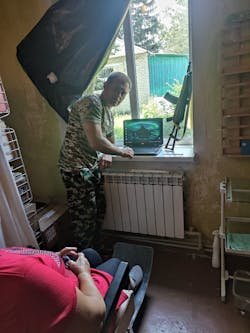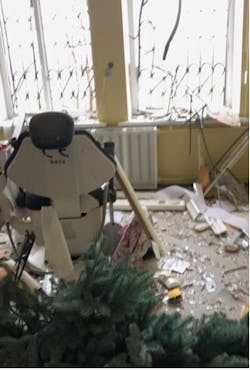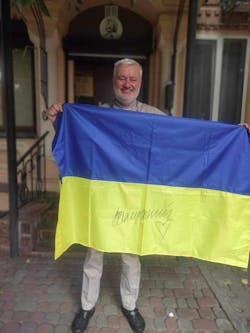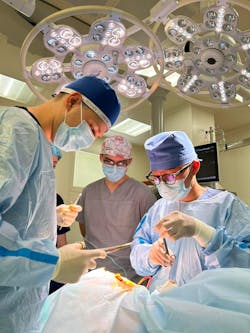The war in Ukraine has taken a staggering toll on the country’s health-care system. As battlegrounds, the occupied regions suffer the most. These towns, once bustling with life, now lie in ruins. Medical care is nearing catastrophic levels. Dentistry has virtually disappeared due to extensive destruction of dental care facilities and a shortage of providers and essential necessities such as water, electricity, and materials.
The existing medical facilities are primarily used by the Russians for their needs, prioritizing the treatment of their wounded soldiers. In these towns, the few remaining dentists are forced to work for the occupiers.
Updates from Ukrainian dentists
Dr. Yuriy Drobotenko, a dentist who survived the occupation of Kherson, enlisted in the Army as the head of a mobile dental clinic, senior lieutenant. He says, “During the initial months of occupation in the spring of 2022, Russians were busy plundering big businesses in Kherson, such as the agricultural sector, seaport, and banks, sparing dental clinics. When the Federal Security Service of Russia arrived, the remaining dentists were pressured to take Russian citizenship and collaborate.
“I insisted that the head of our clinic dismiss all leadership positions and flee Kherson so that Russians did not have particular names to target. The occupiers then offered me the director position, but I refused and was beaten three times for not submitting to their authorities. Despite the risks, I participated in underground resistance, committing arsons and sharing information about the occupant army’s movements with our Ukrainian Armed Forces.”
Dr. Drobotenko continues, “When the Russians finally left Kherson after six months of occupation, they looted everything they could, including dental radiography equipment, materials, and furniture from our clinics. I joined the Army to help our enlisted and civilians because the demand for care is enormous. Working from 8 a.m. until curfew, I am so busy that I can only see patients for acute pain and serious inflammation.”
The deoccupied towns in the war zone now resemble apocalyptic scenes. Places such as Kherson, Izyum, and Svyatohirsk are synonymous with terror and devastation. Rebuilding these towns requires time, effort, and a strong sense of patriotism. While dentists like Dr. Drobotenko choose to stay in the profession through the armed forces, some return to their hometowns to start over, while others seek ways to leave Ukraine permanently.
Dr. Ruslan Kravchenko, a dentist from Vuhledar and a refugee currently residing in Germany, has this to say: “Vuhledar, once a quiet coal mining town, became a ferocious battleground. The remaining residents have stayed behind to take care of the elderly, disabled, and forsaken animals. My relatives live in Spain, so I decided to make my way to Europe. Because martial law prohibits men from leaving Ukraine, I had to go through Russia’s filtration camps.
“The Russians meticulously check refugees’ phones for any pro-Ukrainian beliefs or contacts. It took hours to convince them otherwise. I prepared seriously by destroying my old phone, buying a new one, and building a believable pro-Russian history in it. I passed through occupied Chonhar, Russian Vladikavkaz, Georgian Tbilisi, then Poland, Germany, and finally arrived in Spain.”
Dr. Kravchenko continues, “After eight days in transit, I finally reunited with my family. Am I happy in Europe? I am safe, but without dentistry I feel like nobody. I want to return to Ukraine, but I have lost everything. The Russians destroyed my house, bombed my dental office, and burned my cars. I possess only memories of the past and hope for the future.”
Dentistry near the frontline reflects the current crisis of the health-care system, but in an exaggerated form. The shortage of providers is severely felt, and near Ukraine’s “zero line,” oral surgery takes precedence and focuses on cases of acute pain. Normal dentistry, such as restorations and hygiene, is considered a luxury, and is only available 40 miles away from the “red zone.”
Ukrainian’s excellent self-organization has sparked a unique cooperation between military and civilian dentistry. The only setback is the heavy dependence on the intensity of the battle. After 17 months of full-scale invasion, the situation on the battlefields has worsened and resulted in a decline in dental volunteerism near the trenches.
Read more from Anna Filonenko
From the front lines: Ukrainian dentists’ stories of heartbreak and survival
Challenges of war don’t slow down Ukrainian dental pros
More perspectives from Ukrainian dental insiders
Junior sergeant Dmytro Ivanyuk, a former dental lab technician and current squad commander in the Ukrainian Armed Forces, says, “We are on the verge of giving up on our important initiative. We tried to combine our dental skills with our newly acquired warrior skills to establish military mobile dentistry in our battalion. However, our promising yearlong cooperation with civilian dentists near a front line has come to a halt due to the intensification of the conflict.
“Although dental pain can be terrible, it’s our last concern in Bakhmut. It’s hell here; everything is obliterated, there’s no electricity and water, and there are nonstop heavy artillery attacks. It's impossible to stay outdoors. Yesterday, Russians poured phosphorus on us three times. We bear heavy losses. All soldiers have dental or perio issues, including myself with a fractured tooth. But we must concentrate on survival and postpone big dreams about military dentistry at the front.”
Despite the challenges, there have been some positive developments in dentistry in Ukraine. Mobile dentistry has boomed, responding to the struggles faced by military dentistry. The Pro Cura Militis mission has swept the nation, revealing numerous inexpensive and creative ways to build mobile clinics. These initiatives, which are totally crowdfunded, involve transporting vehicles from Europe and meticulously reconstructing them from expired post vans into evacuation complexes.
Those efforts have gained attention from ordinary Ukrainians who want to donate, as well as military commanders who know the true value of available dentistry near the trenches. Both Ukrainian dental pros and military commanders understand that dental pain can render a soldier incapable and put their unit at risk of taking casualties.
Dr. Valeriy Horbenko, a dentist from Cherkasy volunteering for the Ukrainian Army since the beginning of the war, recently received the most desired award in Ukraine—a flag signed by the Commander-in-Chief General Zaluzhnyi.
Dr. Horbenko says, “Our people are making miracles. In less than a year, we collected the necessary funds, about 40,000 euros, to bring the old DHL mail van from Germany and give it a second life as a mobile medical evaluation complex in Ukraine. Now it is equipped with the A/C system, 6 kVA diesel generator, 10 kVA stabilizer, a pump, a battery control unit with a pulse charger, and everything needed for a dental treatment, including dental unit with carts.
“We are eternally grateful for all donations, and special thanks for the surgical instruments we received from Chicago! I am proud to announce that every hryvnia or dollar donated to our project has been spent wisely. Our new mobile clinic meets all demands of modern wartime dentistry.”
A boom in mobile dentistry
The mobile dentistry boom has not only attracted dentists from different regions of Ukraine, but also foreigners. International volunteers offer their time and supplies, treating both the enlisted and civilians near the warzone. It’s heartwarming for Ukrainians to disprove a war as a complete tragedy. Apparently, for the luckiest dentists, it may turn into a fairy tale.
Dr. Hiroyuki Kawamura, a Japanese dentist who volunteered for the Ukrainian Army at a hospital in Dnipro from May to July 2023, has this to say. “I am a Japanese doctor with no previous military background, but with a sharp sense of historical importance. I could not passively observe the Russian aggression from the outside, so I tried to enlist in the Armed Forces of Ukraine.
“Our news daily counted military men who were like me and ready to fight for Ukraine, but the Japanese Constitution outlawed any war participation, even if it was on the side of good. I failed as a soldier, but I succeeded as a doctor. This united me with the Ukrainian doctors who had training in Tokyo. I fell in love with a doctor named Nastia and followed her to Ukraine, where I wound up performing oral surgeries, endo and … got happily married.”
He continued, “It was the hardest decision in my life to join the Ukrainian defense, but I have never regretted coming to Ukraine. I had a great experience and met good people. I realized that it’s quite noble to fight against the enemy and protect your country, family, and friends. This is something that most people have already forgotten. Ukraine gives us an example of how to be brave. I was given the Ukrainian volunteer medal from the army. This is an honor for me, so I ordered a special portrait that pictures me in my grandfather’s Navy uniform and holding the Ukrainian medal. I will never forget my greatest experience and I will keep supporting Ukraine.”
The state of education for dental students
An Iranian dental student from the top medical university in Ukraine, who is currently residing with his Ukrainian wife in Europe as a refugee and prefers to remain anonymous, said, “Ukrainian dental students are in a sorrowful situation due to war. Our education has not recovered from COVID and now it’s even worse—predominantly online, with students scattered throughout the world, and no clinical hours with real patients.
“I am a senior graduating from dental school, and I haven’t treated a single tooth. Like most students, I fled the war a year ago. Some students have returned, mainly Ukrainians, while foreigners stay safely in their home countries. As an Iranian, I’m stuck between two fires—no return to Iran for obvious reasons, and I cannot come back to Ukraine because the Iranian drones killing Ukrainians cast me in an unfavorable light.”
He continues, “Countless times, I’ve contacted European dental schools and practitioners to get any help, schooling, or training. All my appeals have been met with idle pity. I have met a Ukrainian dentist in the UK who works as a dental nurse, as a team member cleaning operatories and sterilizing instruments. I wanted to cry listening to her story. With zero desire to follow in her steps, I decided to somehow graduate from my university and continue studying in Europe. I’m currently preparing for the Ukrainian KROK State exam and considering applying to the European dental school.”
Ukrainian educators encourage their refugee colleagues to establish contacts with foreign universities and help Ukrainian students abroad. Dentistry, with its strenuous curriculum and variance in licensure requirements, is difficult to transfer overseas. Dental students and their teachers have no choice but to unite and endure.
Andriy Bas, as associate professor at International Humanitarian University in Odesa, prosthodontics instructor, says, “We work in a hybrid format, with 90% online due to the handful of students physically present in Odesa. Most of them have fled Russia’s constant missile attacks, and all foreign students are gone. The bravest ones staying in Odesa get a unique opportunity to shadow local dentists and practice real dentistry. As a private institution with more flexibility and potential for reforms, our university is proud of this initiative. We share our teaching powers with Odesa dentists and dental volunteers. In this dark hour it really takes a city to raise a dentist.”
The war cannot last forever
Believing that the darkness cannot last forever, Ukrainian dental professionals joined the defense as enlisted military and civilian volunteers. Considering themselves vanguards, dentists find ways to physically, financially, and emotionally survive and work to save Ukraine, to preserve its right to stay on the political world map and grow into a strong state with efficient governmental institutions.
Army captain Ihor Yaschenko is a former USSR Army officer, dental supplier, and a founder of the volunteer society Tryzub Dental. He is the head of communication for his battalion. “Ukrainian dentists have been avant-garde since the Soviet times. After the USSR collapse, they were among the professionals who felt the wind of change and overturned old unproductive and unpopular treatment methods in favor of modern esthetics-oriented trends.”
He continues, “In 2014, when the Ukrainian Army faced its first test against the Russians, dentists were again pioneers in modernizing the Soviet Ukrainian Army and its primitive dentistry. After almost 10 years of war, mobile dentistry is booming and demonstrating how Ukrainian society exceeds the Ukrainian state. People get organized and outperform the government. Such an active civil position of most Ukrainians gives us hope that we will rebuild our Ukraine quickly after victory.”
Author’s note: Ukrainian dental volunteers are in urgent need of dental materials, surgical instruments, dental units, and laptops. Contact Anna Filonenko at [email protected] if you want to donate.
